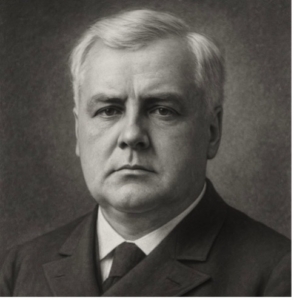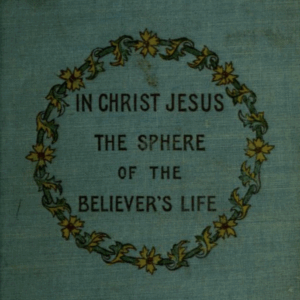“In Christ” Insights from the 1800s
Tony Cooke
I wrote an article two years ago in which I shared insights from two pastors — A.J. Gordon and A.T. Pierson — both of these men wrote in the 1800s. Each had tremendous insights regarding Jesus’ substitutionary death, identification, and the believer’s identity “in Christ.” This new article picks up where the other article left off, providing additional teaching from these two ministers. Enjoy!
A.J. Gordon (1836-1895), author of In Christ: The Believer’s Union with his Lord, (1872).


“The union of the believer with his Lord is a reciprocal union. “You in me, and I in you.” Through it Christ both gives and takes — gives the Father’s life and blessedness, and takes the believer’s death and wretchedness.”
“Christ, in raising man into union with Himself, raises him into all that belongs to Him, into his divine life, and into partnership with his divine work. So that he dies in his death; rises in his resurrection; ascends in his ascension; is seated with Him in his session at the Father’s right hand; and lives in his eternal life.”
“If one is in Christ, he must have regeneration; for how can the Head be alive, and the members dead? If one is in Christ, he must be justified; for how can God approve the Head, and condemn the members? If one is in Christ, he must have sanctification; for how can the spotlessly Holy remain in vital connection with one that is unholy? If one is in Christ, he must have redemption; for how can the Son of God be in glory, while that which He has made a part of his body lies abandoned in the grave of eternal death?”
“’But now is Christ risen from the dead.’ And since we are risen with Him, we are not in our sins. In his renewal from the dead, we were lifted forever from their dark enfolding condemnation. They cannot bind a single fetter on us now; they cannot remand us for a single instant to the prison-house of despair.”
“But not only does our resurrection in Christ raise us out of condemnation; it also lifts us into a new life in Him. In Christ crucified we put off the old man, in Christ risen we put on the new man. The cross was for the destruction of the body of sin; the resurrection was for imparting to us the principle of divine life.”
“The Resurrection of our Lord then is not merely a pledge of our own; it is our own if we are his. All that it did for Him, we may boldly say it did for us if we are in Him.”
“A negative process is not adequate to accomplish a positive result. And no amount or kind of self-denial can make one holier, unless this be the means of bringing him into more intimate fellowship with Christ. Every retreat from the life of the flesh must be followed by a deeper entering into the life of the Spirit. Self-denial is, according to its degree, a parting company with Adam that we may not walk after the flesh; but prayer and faith and love and obedience must accompany, as the means of joining ourselves more entirely to Christ, and of abiding in Him, that we may so walk even as He walked.”
“Communion with Jesus is a certain means to the excommunication of sin. Growth in grace can never fail to promote the subjection of nature. If we have striven in vain to root out the tares which the enemy has sown in the heart, we may yet rejoice to know that they cannot endure the burning heat of Christ’s unclouded presence.”
“We sighed for the love of God before, but could find no sense or assurance of it, because we could find nothing in us or upon us which it could approve. But now we see how as risen with Christ we have been borne up into the favor of the Father and into the full fruition of the prayer, ‘that the love wherewith Thou hast loved me may be m them and I in them!’”
A.T. Pierson (1837-1911), author of In Christ Jesus: The Sphere of the Believers Life, (1898).


“Those three short words, ‘in Christ Jesus’ are, without doubt, the most important ever written, even by an inspired pen, to express the mutual relation of the believer and Christ. They occur, with their equivalents, over one hundred and thirty times. Sometimes we meet the expression, in Christ, or in Christ Jesus, and again in Him, or in Whom, etc. And sometimes this sacred name, or its equivalent pronoun, is found associated with other prepositions — through, with, by; but the thought is essentially the same.”
“Oh, the unclaimed riches of the believer in Christ Jesus!”
“He who is risen with Christ, and has the Breath of God in him, should live as a risen, quickened, breathing son of God, and walk in the Spirit in newness of life.”
“We might compare the two epistles thus:
Romans : Justified in Christ Jesus by His blood.
Corinthians: Sanctified in Christ Jesus by His Spirit.
And, through both of the Epistles to the Corinthians, the golden thread of connection is our union with Christ by the indwelling and inworking of His Holy Spirit.”
He, the mighty and the holy One, He was wounded, bruised, chastised! He was treated thus, not because He deserved it, but for our sakes, because we deserved it. His punishment is our peace. His stripes are our healing. His death our life. O greatest of all facts! Well mayest Thou have the central place in prophecy, the central place in our hearts! This is the Gospel. To believe this is to be saved; He has borne the stripes and punishment due to each believer, who will, therefore, have none to bear. To believe this is to be happy, for it is to see a substitute in our place of doom and death, setting us free! To believe this is to be holy, for faith in such facts must make us love the One that suffered in our stead, and hate the sin that brought sore stripes on Him.”
“This letter to the Ephesians lifts us to the very summit, the third heaven of privilege, and is especially rich in that phrase which we are now devoutly tracing throughout the New Testament. We find here at least ten separate uses or combinations of the words in Christ or in Him, as applied to the present estate of the believer, and as exhibiting His possible heavenly life even while on earth; and there is one besides which refers to coming blessing. In this epistle we are declared to be, IN CHRIST, chosen, predestinated to the adoption of children, accepted; to have redemption and forgiveness, to be quickened or made alive, raised, seated in the heavenlies; to have been sealed and to have obtained an inheritance : these are the ten present blessings, and the one, yet future, is that in Him we are to be gathered together in one, with all saints, at His coming.”
“And remember the sublime saying of the sainted George Mueller. When his helpers were asked how they could account for the fact that his serene calm was undisturbed when, with two thousand orphans to clothe and feed, there was neither food in the larder nor money in the bank, and his one resort was prayer — the answer was, that it could be accounted for only on his own philosophy: ‘Where anxiety begins, faith ends; And where faith begins, anxiety ends.’”
“Christ came to do God’s will, and took in His incarnation a body prepared for Him, and in a higher sense, another body — the Church — after His resurrection. This body is thus seated with Him in the heavenlies, and all enemies are to become the footstool of Christ and His mystical body, bruised under His feet. We have a right in Him to this exalted seat in the heavenlies, and to sit down with Him in peace, as those who have the sense of a finished work and completed conquest, henceforth in Him expecting — anticipating, that all foes will be made our footstool. So far as we can take this in by faith, they are already subdued.”

